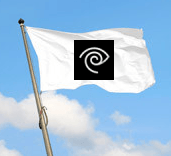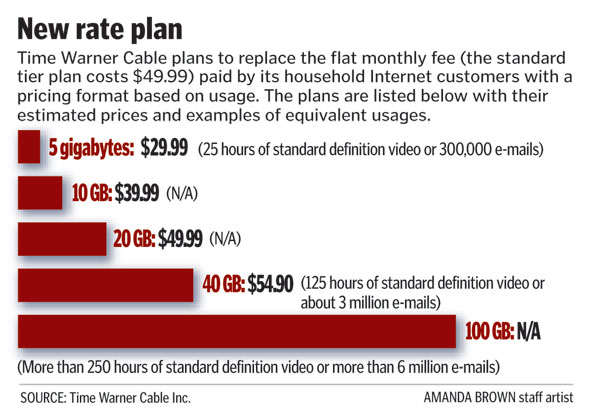
Worst
Broadband customers in Lawrence, Kan. have been liberated from Internet Overcharging schemes after years of usage-capped Internet access from Sunflower Broadband and Knology.
WideOpenWest’s (better known as WOW!) acquisition of Knology, which in turn purchased Sunflower Broadband from the local newspaper, means usage limits are a thing of the past.
Consumer Reports has top-rated WOW! for customer friendly service, and banishing usage caps is an example of why the cable company earns such high marks.
The company reminds customers that “all WOW! Internet speeds have no usage caps.”
Sunflower Broadband originally offered four different broadband plans, only one without usage caps. Lawrence customers did get speed upgrades faster than many other cable broadband customers, but most were accompanied with draconian usage limits.

Bad
♦ Bronze: Originally offering 3Mbps/256kbps service, Sunflower’s “lite” usage plan included a 3GB monthly usage limit boosted by Knology in 2012 to $22.95/month offering 3/1Mbps service and a still ridiculously low 5GB usage limit. WOW! has kept the lite plan but removed the usage cap.
♦ Silver: Sunflower’s equivalent of Standard Internet service offered 10/1Mbps broadband with a 50GB usage cap. Knology raised the price to $37.95, left the 50GB cap intact and increased speeds to 18/2Mbps. WOW! dropped the cap.
♦ Gold: Sunflower’s premium 50/1Mbps service offered 250GB of usage for under $60 a month. When Knology took over, speeds were boosted to 50/5Mbps along with the price: $62.95 a month. But the usage cap stayed the same. Today WOW! continues the plan without any caps.

Much Better
♦ Palladium: Sunflower responded to customer complaints about metering Internet usage by offering residents a trade — an unlimited use plan with no speed promises. Palladium could be as slow as 2Mbps during peak usage, 25Mbps when traffic was very low. Knology kept the plan and its 1Mbps upload rate, but raised the price to $47.95 a month. WOW! dumped Palladium altogether, replacing it with a 30/2Mbps unlimited use plan for customers who don’t want to pay $63 a month for the Gold plan.
A number of Lawrence customers annoyed with Sunflower and Knology switched to AT&T U-verse when it was introduced locally. Although U-verse has a 250GB usage cap, Lawrence residents report it remains unenforced.
Stop the Cap! reader Mike, who shared the news WOW! had recently shelved the caps, tells us he switched to AT&T years ago and is happy with their service.
“So far, their cap is not enforced at all here,” Mike writes. “The minute they start enforcing it, I’ll switch to WOW!”


 Subscribe
Subscribe

 If Time Warner Cable is concerned about the rising cost of cable television, it sure didn’t show it after sources revealed the cable company quickly accepted CBS’ demands for more compensation but is refusing to budge until it wins rights to show CBS programming on mobile platforms.
If Time Warner Cable is concerned about the rising cost of cable television, it sure didn’t show it after sources revealed the cable company quickly accepted CBS’ demands for more compensation but is refusing to budge until it wins rights to show CBS programming on mobile platforms.

 In addition to an August
In addition to an August 


